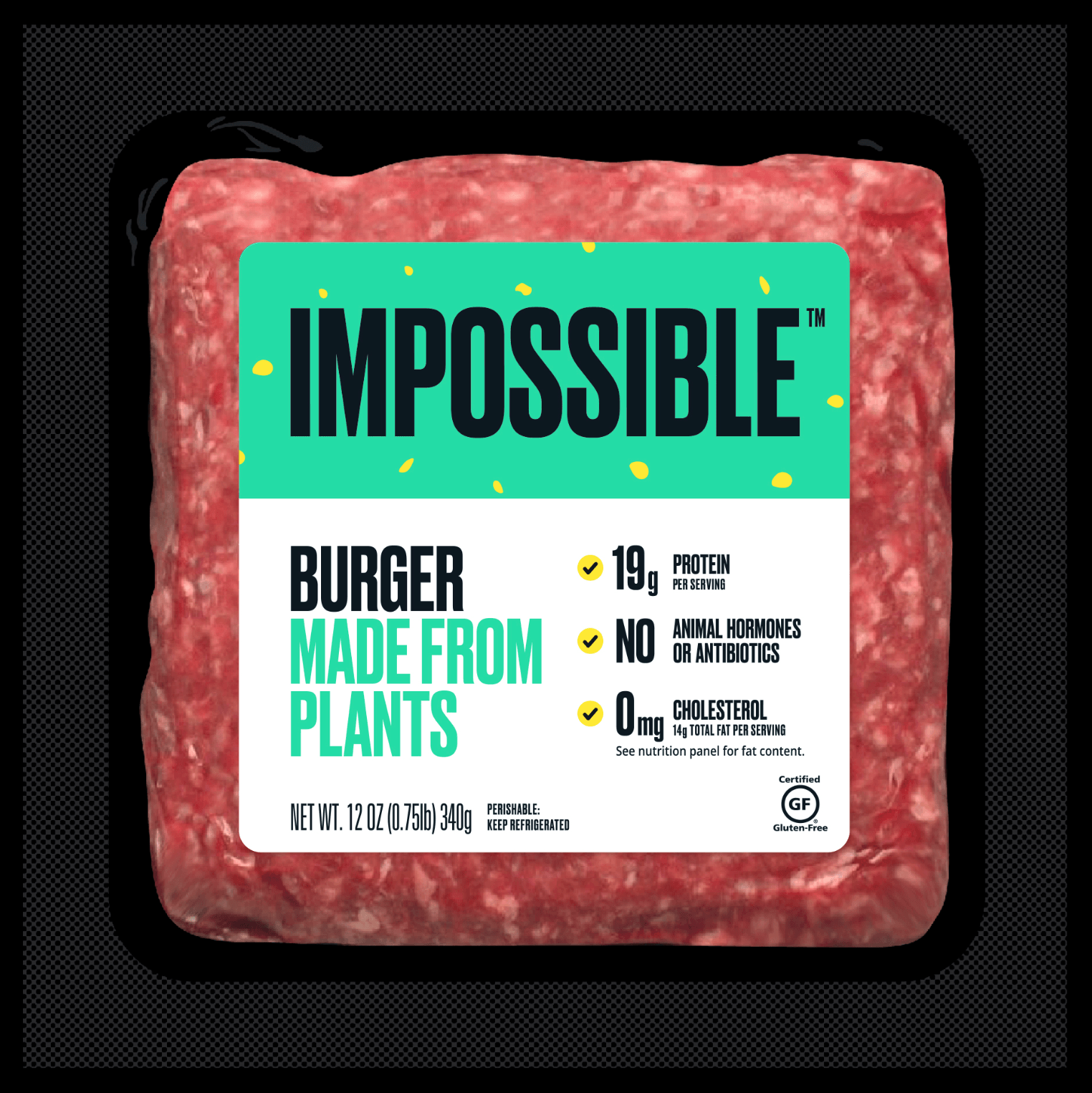It’s been tumultuous week in the plant-based protein world. This week Impossible Foods announced the much-anticipated launch of its Impossible Burger ground protein product at Gelson’s in Southern California. The company’s retail launch is behind its main competitor Beyond Meat, which has been in retail stores for months with its burgers and sausages and launched a similar ground protein substitute for retail sale in June.
According to the Good Food Institute (GFI), a nonprofit aiming to eliminate livestock production, plant-based burgers are a key growth driver for plant-based meat substitutes, with sales increasing more than five times as fast as other plant-based protein substitutes.
With refrigerated plant-based burgers driving sales growth, the plant-based meat market is now worth more than $800 million, with sales up 10% since 2018 and growing more than five times as fast as conventional meat sales, which have grown just 2% since 2018, GFI told us.
“Impossible Foods’ retail debut will prompt a rapid acceleration in plant-based meat market growth. Impossible’s entry into retail will help expand and strengthen the plant-based meat market, giving consumers more choice and stimulating demand across the entire sector,” GFI executive director Bruce Friedrich wrote in a statement about Impossible Foods’ retail launch.
“Plant-based meat has an enormous growth opportunity and currently commands less than 1% of the US meat market. Rather than stealing market share or competing with plant-based incumbents like Beyond Meat, Impossible Foods will be competing with conventional meat and will be expanding the share of the pie that goes to plant-based over conventional meat,” he added.
Friedrich may be discounting the fact that Impossible Foods is elbowing its way into the retail space that’s recently become quite crowded with a slew of me-too product makers including Kroger’s Simply Truth, Hormel’s Happy Little Plants, Kellogg’s Incogmeato, Tyson’s Raised & Rooted, and Nestle’s Sweet Earth.
Price may soon play a more important factor in the thickening market for these companies. Impossible Foods’ ground meat substitute costs $8.99 per 12-ounce package, while Beyond Meat sells for roughly $12 per pound. Whole Foods veggie burger patties sell for $6.40 per pound while the retailer offers ground grass-fed beef for $5 per pound.
Meanwhile, Canadian restaurant chain Tim Hortons announced that it will be scaling back offerings of Beyond Meat’s products from its menus at most of its locations. This marks one of the first occasions that the plant-based protein industry has seen the market hit the brakes instead of continuing to step on the gas.
Although it plans to keep offering Beyond Meat products in breakfast sandwiches in Ontario and British Columbia where it was “positively received,” the remaining store locations will stop offering them once existing supplies run out. The backpedaling comes only months after Tim Hortons announced the addition of Beyond Meat to its menus, launching breakfast sandwiches in June and Beyond Burgers in July. The move follows equity analysts’ “sell” rating on Beyond Meat stock due to concerns about its growth potential.
Other restaurant chains that have outspokenly eschewed plant-based proteins include Chipotle, claiming that they’re too processed, Arby’s, and Red Lobster. And, as the discussion surrounding plant-based protein substitutes deepens, a rising chorus of stakeholders is calling attention to the unhealthy implications of many of these offerings.
Whole Foods CEO Rob Mackey argued that swapping out beef for a processed veggie burger misses the mark and that people should focus more on eating whole foods instead of highly processed substitutes.
(Mackey’s former partner Walter Robb told our editor Louisa he was also skeptical about processed meat alternatives on her podcast Future Food earlier this year.)
Beyond Meat’s Beyond Burger boasts 18 ingredients while the Impossible Burger packs 21, including a GMO derived yeast called heme as the main ingredient. Mackey is not alone in this sentiment. According to a recent Whole Foods study, 63% of millennials want more plant-based foods, but they want them unprocessed, too. This presents a challenge when more plant-based meat substitutes fit squarely into the Food & Agriculture Organization’s newly-released definition of “ultra-processed foods.“
And while 98% of alternative protein buyers are still purchasing conventional meat, consumers are looking for more plant-based options and entrepreneurs are creating various offerings to meet that demand beyond meat alternatives.
Just this week, for example, Danish startup Simple Feast announced a $33 million Series B led by 14W with participation from existing investors for its home-delivered, ready-to-eat frozen fruit and vegetable meals. The funding brings the startup’s funding to $50 million. It uses Forest Stewardship Council-approved cardboard boxes, drinkable cartons of frozen tap water to keep the food cool, and 100% organic produce and delivers weekly boxes with three plant-based meals that are ready to eat in 10 minutes. (Find out more in a brief from Joe here.)
What do you think? I want to hear from you! Email [email protected]





